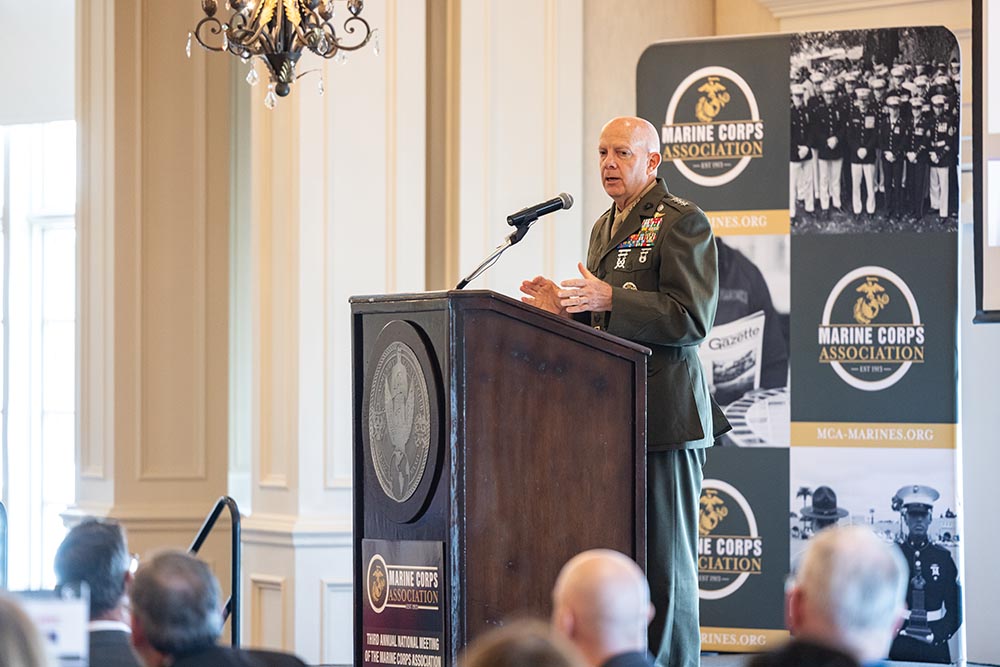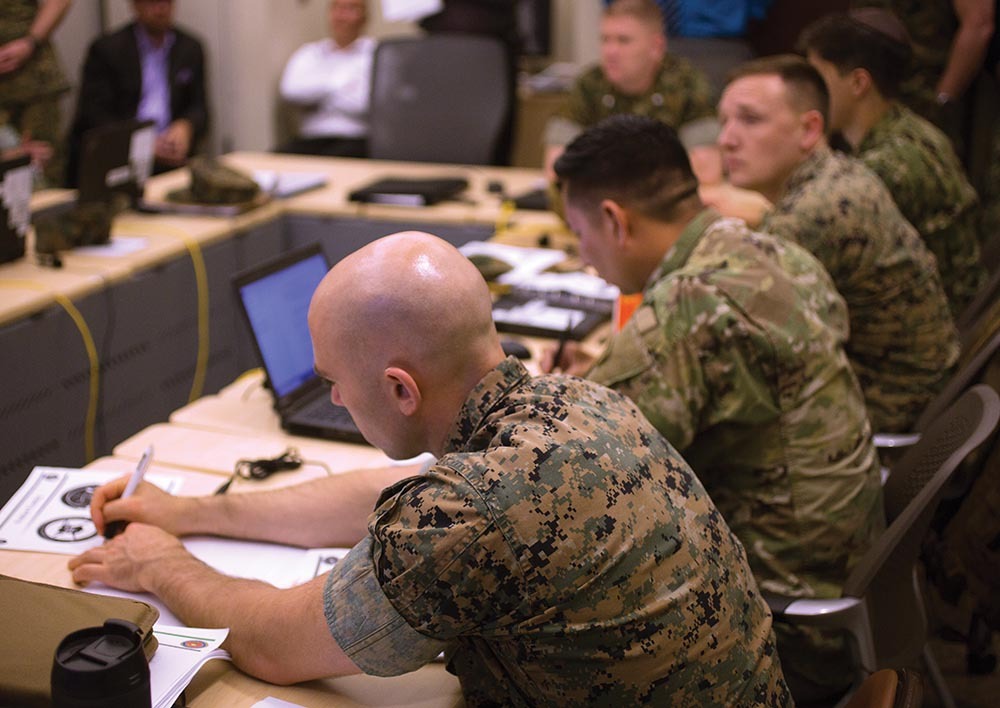Military Leaders, Doctrine Encourage Criticism
By 2ndLt Kyle Daly, USMC
When a Marine lieutenant colonel was relieved of his command in August 2021 for publicly criticizing military leadership on social media, Major Brian Kerg received a message from one of his best Marines.
Kerg, a communications officer and operational planner, had written more than a dozen articles for a military journal. Some of the articles were critical of military practices.
The first lieutenant who messaged Kerg wanted to know why LtCol Stuart Scheller was facing negative consequences for his public criticism of senior leaders, while Kerg had never been in trouble for his writings.
“He messaged me and he had that question,” Kerg told Leatherneck. “Hey sir, what’s going on here? You write articles that are critical of things, and sometimes, pretty assertively so. Meanwhile, this guy comes along, and he’s being critical as well, but he’s getting canned. His career is over.”
Kerg initially wrote the Marine a lengthy response, trying to answer all his questions and concerns. But then he realized, if one person had this concern, others did as well.
That lengthy response morphed into an article that was published in the September issue of the U.S. Naval Institute’s monthly journal Proceedings. The article, “How Active-Duty Officers Should Criticize Policy and Practice,” explained that criticism is not only allowed in the sea services but encouraged. However, Kerg writes, it must be done appropriately and in a professional manner.
“There is a fine line between honest critique and undermining faith in the chain of command,” Kerg writes in his article. “On one side, servicemembers are given wide latitude to vigorously debate policy and practice. On the other, members risk conflating private opinion for official policy, can abuse the privilege of their office, and set bad examples to those they are charged to lead. This issue is simultaneously simple and complex.”
The “fine line” that Kerg writes about in his article seemed to fuel confusion and debate among veterans and civilians who commented on LtCol Stuart Scheller’s first video post, which was uploaded on Facebook and LinkedIn.
Scheller, a 17-year infantryman and the commanding officer of Advanced Infantry Training Battalion-East, posted the video just hours after news broke that 13 servicemembers—11 of them Marines—had died in a bombing at the Hamid Karzai International Airport in Kabul, where the U.S. military was engaged in efforts to evacuate personnel from the country. Scheller filmed himself talking into the camera, wearing his uniform that showed his rank insignia, name and branch of service. Scheller criticized the way in which top military leaders handled the Afghanistan withdrawal and were not admitting to possible mistakes.
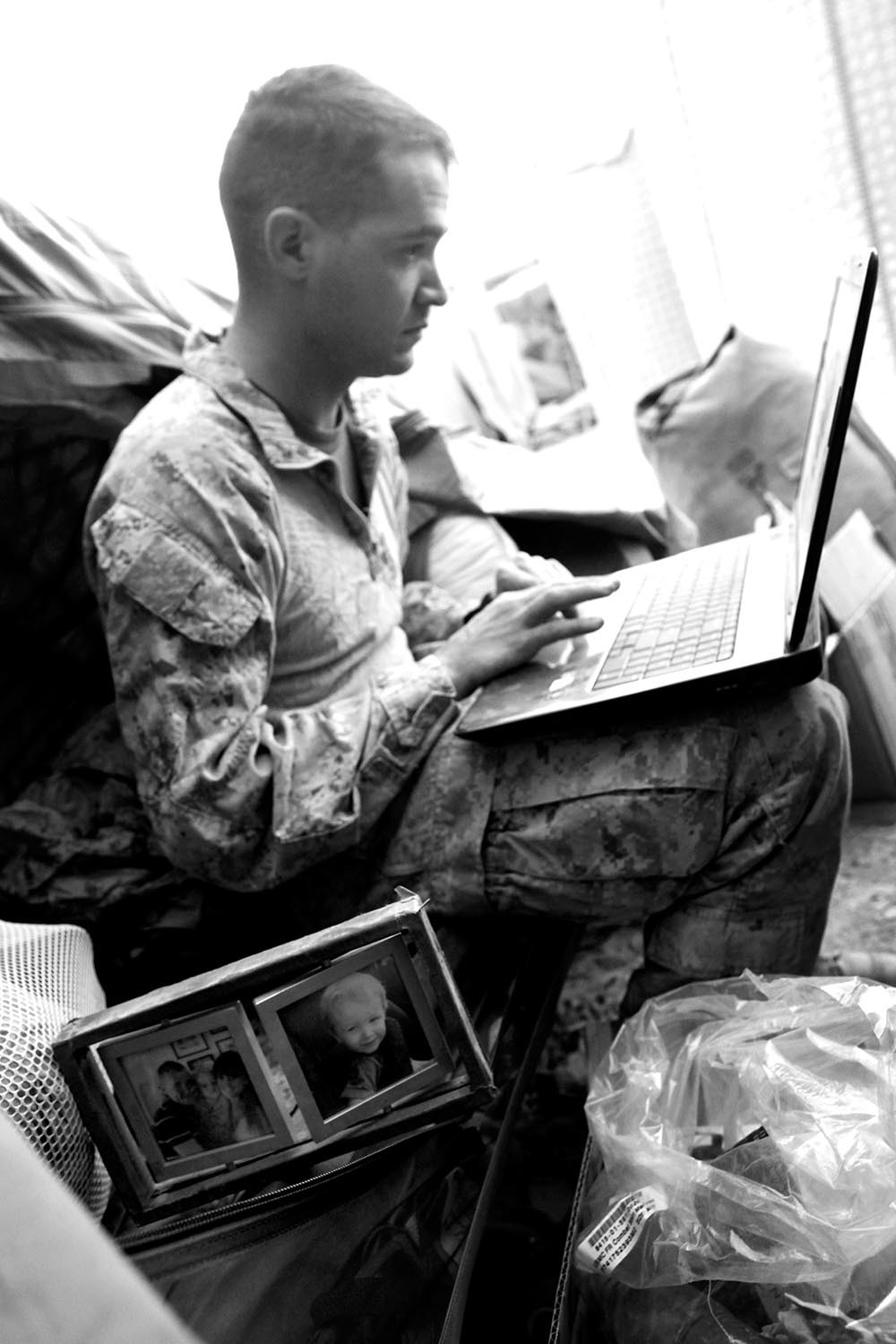
Sgt Daniel Pluth, 1st Bn, 6th Marine Regiment, uses his laptop computer after finishing his shift in Sangin District, Helmand province, Afghanistan, Oct. 6, 2011.
“People are upset because their senior leaders let them down, and none of them are raising their hands and accepting accountability or saying, ‘We messed this up,’” Scheller said in the video.
Scheller would go on to make other video posts despite instruction from his command not to do so. He was eventually court-martialed and at a hearing in October, pleaded guilty to various charges, including conduct unbecoming an officer and a gentleman. In social media posts in August, he said he resigned his commission. By December, he was out of the Marine Corps. Scheller has written a book called “Crisis of Command: How We Lost Trust and Confidence in America’s Generals and Politicians.” It was published by Knox Press and will be distributed by Simon and Schuster in September 2022.
On Simon and Schuster’s website, a description of the book states: “Scheller spoke out, and the generals lashed out. In fact, they jailed him to keep him quiet … Now Scheller is free from the shackles of the Marine Corps and can speak his mind.”
According to Stars and Stripes, the first video Scheller made received more than 300,000 views and 22,000 shares on Facebook and LinkedIn, and more than 4,000 comments within the first 24 hours.
One commenter, who identified himself as a medically retired gunnery sergeant, wrote, “You do not help troops by showing you have no confidence in the leadership. He’s harming the Marines who will have to deploy to this combat zone to unscrew this disaster, because if you don’t follow orders, you can have no discipline … I do not disagree with what he said at all. But he needs to hang up the uniform and then say it.”
Another commenter, who also identified as a veteran, had a different take: “This LtCol put his neck out on the line for the Marines. He should not be punished or chastised for doing so. We should see leaders who are willing to sacrifice everything for their Marines, and far too often we see leaders who would sacrifice their Marines for everything.”
Kerg read the comments on Scheller’s video post and received questions from people he knew. In his article, he wrote that an analysis of the viewpoints revealed confusion about “the essential issue.” Kerg summed up that issue in one question: “Is honest, frank critique of policy and practice truly permitted?”
His answer: “Yes, it is!”
Members of the military, including junior enlisted and young officers, are allowed to openly disagree with their superiors and express criticism of policies and practices. In the decision-making process at the tactical level, young officers are taught to listen to their subordinates’ concerns. And with major policies and practices drawn up by commanders who operate at the strategic and operational levels, forums, such as military journals, exist for individuals of all ranks to voice their ideas and concerns in a public setting.
Dissent—specifically, loyal dissent, or being critical while remaining loyal to the institution—is encouraged.
This encouragement has come in the form of doctrinal publications as well as the public writings and speeches by senior military leaders. Numerous articles and essays—including Kerg’s—have been written about how to engage in that dialogue in a professional manner.
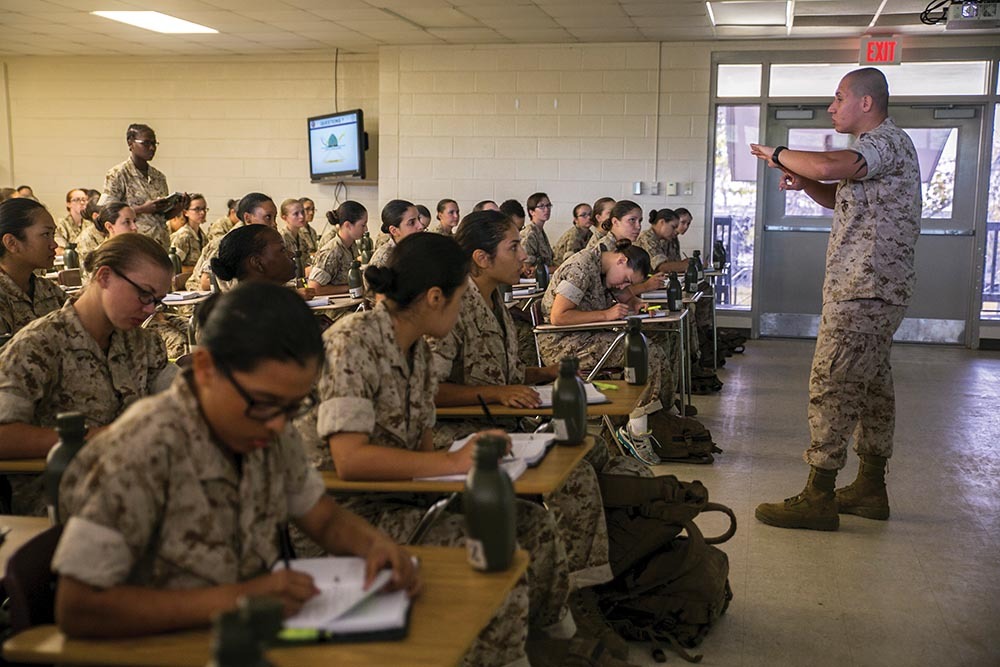
Recruits from Oscar Co, 4th Recruit Training Battalion, Recruit Training Regiment learn Marine Corps history at MCRD Parris Island, S.C., Oct. 29, 2014. Recruits receive six history classes that range from the Marine Corps’ founding in 1775 to recent operations in Iraq and Afghanistan.
During a lecture at West Point in 2008, then-Secretary of Defense Robert Gates told future Army officers that he was impressed with how the Army’s professional journals allow officers to critique their leadership.
“I believe this is a sign of institutional strength and vitality,” Gates said. “I encourage you to take on the mantle of fearless, thoughtful, but loyal dissent when the situation calls for it. And, agree with the articles or not, senior officers should embrace such dissent as a healthy dialogue and protect and advance those considerably more junior who are taking on that mantle.”
LtCol Michelle Macander cited Gates’ comment on loyal dissent in her essay published in the online national security publication War on the Rocks in December 2021. Macander said the inspiration for the article, “How to Dissent Without Losing Your Career, or Your Republic,” came from the Scheller episode and a media narrative that the military was stopping servicemembers from being allowed to dissent.
“That’s not the case at all,” Macander told Leatherneck. “You just have to do it within a certain manner. And you have to be professional while you’re doing it. I think the more people that say that, the better. And the more venues that are publishing it, the better.”
As a commander, Macander, a combat engineer officer, said she encouraged honest opinion and feedback up to the point of when a decision was made. “And then once a decision is made, you step out smartly,” she said. Macander, who was assigned as a military fellow at the Center for Strategic and International Studies, said this form of dissent is taught at the tactical level, but she believes it transcends up.
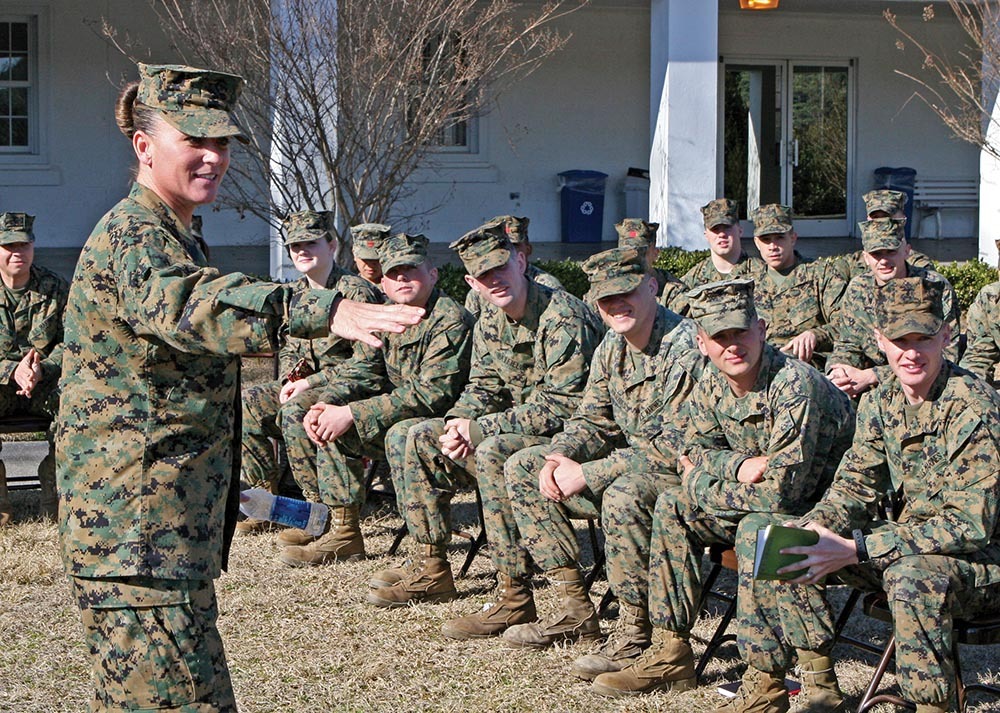
1stSgt Denise M. Ruiz, Headquarters Company, Combat Logistics Regiment 27, 2nd Marine Logistics Group, calls on a Marine during a noncommissioned officer discussion at Camp Lejeune, N.C., Feb. 11, 2010.
Marine Corps doctrinal publications describe this type of loyal dissent.
MCDP 1, Warfighting, states that until a commander has reached a decision, “subordinates should consider it their duty to provide honest, professional opinions even though these may be in disagreement with the senior’s opinions.” But once that decision is reached, “juniors then must support it as if it were their own.”
Warfighting also states that senior leaders must encourage candor among subordinates, and that compliance for the purpose of personal advancement will not be tolerated. MCDP 7, Learning, goes a step further, saying that “all Marines prepare themselves to become leaders by exercising humility and being open to constructive feedback.”
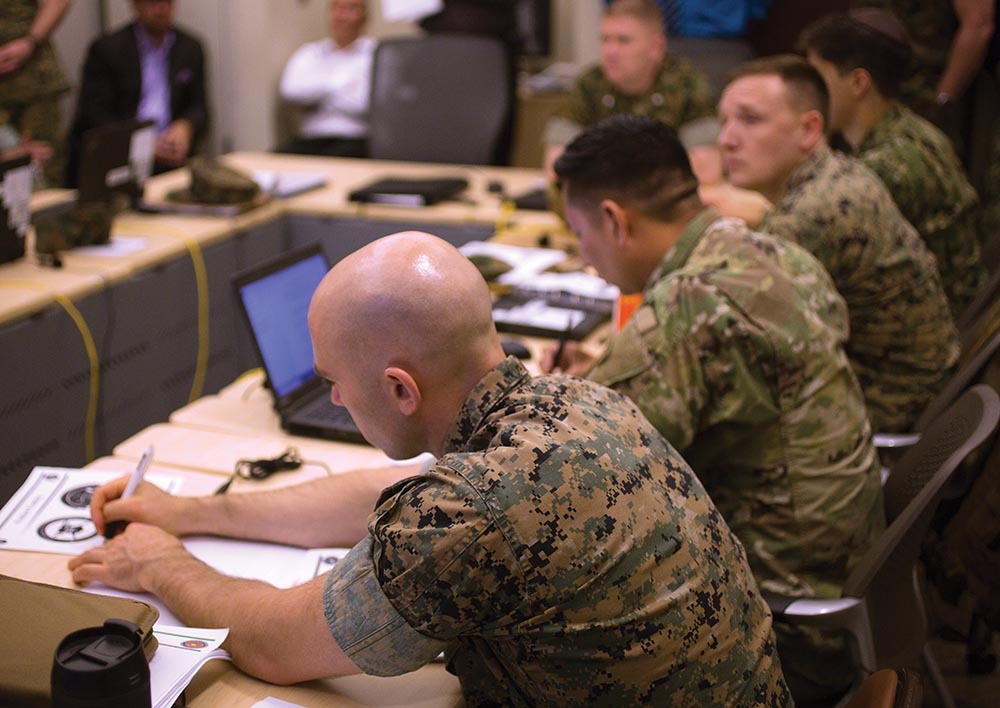
Exercise participants take notes at a brief during Combined Unit Exercise (CUX) 19.1 at Marine Corps Information Operations Center, MCB Quantico, Va., April 10, 2019. (Photo by LCpl Garrett Jones, USMC)
A ‘Precious Mechanism’MCWP 6-10, Leading Marines, references an article written in 1986 by then-retired LtGen Victor H. Krulak. Krulak’s essay, “A Soldier’s Dilemma,” published in Marine Corps Gazette, lays out a set of rules for subordinates on how to dissent and rules for commanders on how to accept criticism.
In the essay, Krulak emphasizes multiple times the importance of using the chain of command. Krulak describes the chain of command as “the precious mechanism by which all military activity is driven.”
“The dissenter should use it,” he writes.
The dissenter should put their idea on paper and take to it to their immediate superior. However, Krulak acknowledges, a superior might not be interested in adopting the idea that a dissenter sets forth. In that case, the dissenter should seek the highest authority involved in the issue, but with his or her immediate supervisor in the know.
“But the key point is this: The idea is now in the open, well-developed and well-expressed,” he writes. “And somewhere in the chain of command there may just be someone with the interest and perception to take up the cause—if it’s a good one.”
Deciding to make a public social media post instead of using the chain of command to air a grievance was one point brought up several times by commenters on Scheller’s video post. One subject of contention among commenters was whether to trust the chain of command since senior leadership was the target of Scheller’s grievances.
“The chain is fractured,” one commenter said. “I have never seen such loss of confidence in my adult life.”
Having faith in the chain of command is a piece of advice offered in a 1998 essay written by Marine Corps LtCol Mark E. Cantrell. The essay, published in Marine Corps Gazette, was titled “The Doctrine of Dissent.” In the essay, Cantrell suggested that the military “develop a doctrine for dealing with dissent and the mistakes that inspire it.”
Like Krulak, Cantrell was writing about the loyal dissenter, or a person who has a disagreement with an idea but remains loyal to the institution and their command. Also like Krulak, Cantrell writes that if the dissenter is unable to change their superior’s mind, and if the issue is important enough, then they should go to the next person in the chain of command while having the courage to inform their immediate superior that they are taking this route.
“Stick to your chain of command,” Cantrell writes. “Right or wrong, you’ll make few friends by going to the press or Congress to resolve a problem that could have been corrected by Marines. If you are right, there is a Marine somewhere in that chain who will see it.”
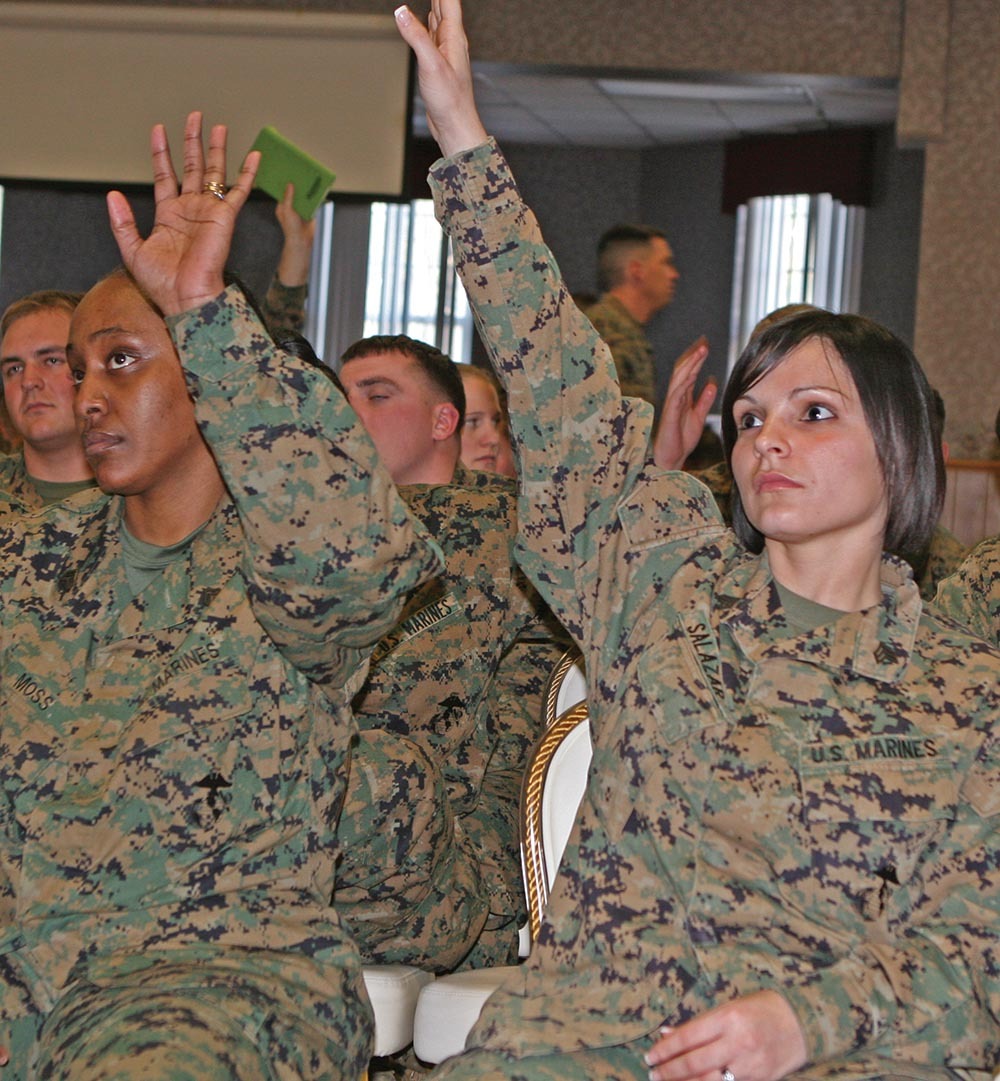
Sgt Melissa Salazar, right, a food service specialist with Combat Logistics Regiment 27, 2nd Marine Logistics Group and other noncommissioned officers from the regiment raise their hands in response to a question during a class aboard Camp Lejeune, N.C., Feb. 11, 2010.
Cantrell’s essay is mentioned in another article written by George E. Reed, a former Army officer and currently the dean of the School of Public Affairs at the University of Colorado Colorado Springs. The essay, “The Ethics of Followership and the Expression of Loyal Dissent” was presented at the International Leadership Association’s annual conference in 2012. Reed holds a doctorate in public policy analysis and administration and is an expert on the subject of leadership.
He writes that Cantrell’s essay seemed to be aimed at junior Marines since a person of a higher rank has fewer people to appeal their concerns to. “His faith that a Marine somewhere in the chain will recognize a position as right might strike some of us as hopeful at best and quite possibly naïve, yet the respect for the better nature of the organization that his approach connotes seems commendable,” Reed writes.
Reed’s essay, which did not exclusively focus on dissent in the military, states that the military might be unique in that it puts great emphasis on expressing dissent within the organization before one decides to take an idea or concern public. “Few other organizations emphasize the chain of command to such an extent, but most would agree that one should give the existing authorities a full opportunity to address a problem before taking it over their heads,” he writes.
In speaking with Leatherneck, Reed, a retired Army colonel, said if a person is dissenting in the military because they think they have a better idea than a superior or they are critical of a superior’s decision, one of the problems they might face is “rank perspective.”
“The world I saw as a second lieutenant and my concerns and what I cared about were in many respects limited by my role and my experience,” Reed explained. “My perspectives as a colonel were very different. And I’m sure the perspective of the Secretary of Defense were very different from the one I had.”
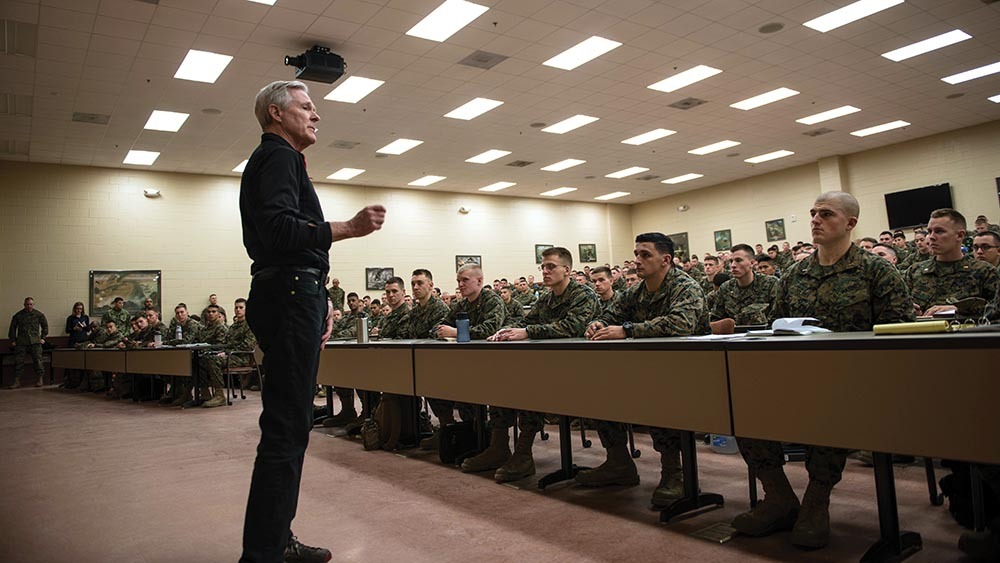
Secretary of the Navy, Ray Mabus, speaks to a classroom of Marine officers at The Basic School about the future of the Marine Corps during his visit to MCB Quantico, Va., Jan. 27, 2016.
While researching the topic of loyal dissent, Reed recalls coming across literature written by a servicemember who advised the dissenter to begin with the assumption that their senior leadership is privy to information that they are not. “You need to start with that assumption,” Reed said. “That they may know something that you don’t because of the limitations of your perspective.”
That doesn’t necessarily mean that’s the end of the story, Reed explained. But it should be the starting point for the dissenter.
In a written statement Scheller gave at his court martial, Scheller said he believed that addressing his concerns “within the chain of command would be ineffective.”
“I knew my complaints would never be heard by the Commandant, the SECDEF, the Chairman of the Joint Chiefs, or the American people if I went through the proper channels,” he stated.
In early June, Leatherneck reached out to Scheller via a private message on LinkedIn to gain his perspective on how he delivered his initial message and whether there was another way to make an impact and have his concerns addressed. Scheller responded by criticizing the focus of this article, and then posted a screenshot of his response on his public LinkedIn and Facebook pages, which, as of the publication of this article, can still be viewed.
Scheller, however, did expand on his views in a February video interview with Marine Corps Times, stating his belief that the proper channels are “broken.”
“I thought about this beforehand,” Scheller said. “Does going through the system, via IG complaint, request mast, all of these processes, would that be effective? And I came to the conclusion that it wouldn’t be, based on my experiences of watching these processes before. And so everyone wants to talk about these processes, but they don’t address why they’re broken.”
‘Emotions in the Background’
LtCol Macander’s War on the Rocks article offers several criteria servicemembers must follow to achieve what she calls “allowable dissent.” Two of those criteria are to remain professional and to avoid personal attacks.
To remain professional, Macander writes the person should “avoid disrespectful language, focus on the institution or policy being criticized, and use objective analyses to bolster the argument.” In her article, Macander said that Scheller used “emotional and unprofessional language,” and that such language shouldn’t be used in a public forum when the goal is to change or improve the institution.
Cantrell’s “The Doctrine of Dissent” states that “even rational arguments sound suspect if delivered with too much feeling.”
“Although important issues will often be emotional, you’ll want to keep those emotions in the background if you wish to be persuasive,” Cantrell writes.
When Scheller posted his first video, the lieutenant colonel said he had a “growing discontent and contempt for my perceived ineptitude at the foreign policy level.” In Macander’s opinion, these words from Scheller were both “emotional” and “unprofessional.” Those who cross the line of professionalism in the military—especially commissioned officers—could face legal consequences. Some of the charges that were brought against Scheller were related directly to the lack of professionalism he showed in his first and subsequent video posts.
Among the charges that Scheller pleaded guilty to at a court martial last fall were contempt toward officials and disrespect toward superior commissioned officers. In his first video, Scheller called out several high-ranking officials, including Secretary of Defense Lloyd Austin and Commandant of the Marine Corps General David Berger. In her essay, Macander asserts that “had Scheller not focused on personal attacks, he may have avoided those charges.”

A Marine with Combat Logistics Battalion 6, 2nd Marine Logistics Group, takes notes during a call-for-fire class held at Twentynine Palms, Calif., May 6, 2013.
A Case for Professional WritingMaj Kerg has encouraged both peers and junior Marines to write for professional journals. In his essay about dissent, Kerg wrote that professional journals present a good place for a servicemember to express criticism since the publishers “know the profession and serve as guard rails that can protect authors and speakers from themselves.”
LtCol Macander said the original version of her essay—a more opinion-based version—was rejected by War on the Rocks. She rewrote the essay and pitched a version that was more “fact-based.” They accepted it. But that wasn’t the end. “I think we went through three rounds of editing,” she said. The editor had questions for her that she didn’t think of, and she was forced to answer arguments that readers might have had if one of the drafts were published.
The medium in which one delivers their dissent is as important as the message, Macander writes. Social media—where Scheller decided to deliver his message—could be that medium, but it presents some challenges. “While [social media] is appealing in its power to quickly disseminate an idea to a broad audience, the ability for a dissenter to post on impulse could more easily result in an unacceptable message,” Macander states in her essay. A professional journal, on the other hand, requires one to go through an editing process and a peer review.
Military journals also present disclaimers that are required by the Department of Defense. When publishing a written work on a topic related to the department and its activities, DOD employees must have a disclaimer that states that the views expressed are those of the writer and do not necessarily represent the views of the DOD or its components. Kerg writes that professional military journals generally have disclaimers printed in every issue and on their websites.
In the same month that Kerg’s article on dissent was published, Proceedings also published a piece by Kerg titled “Dare to Write.” In this article, Kerg writes that every leader in uniform has ideas that should be shared, and that professional writing is one of the most effective ways to do this.
His article quotes former Chief of Naval Operations Admiral John Richardson, who, in 2016, coauthored an essay that encouraged naval servicemembers to develop habits of reading and writing. Richardson encouraged servicemembers to not only write their ideas, but to expose those ideas to public scrutiny.
“An argument properly conceived and defended can be of great value to our profession,” Richardson writes.
Kerg told Leatherneck that junior leaders in the Marine Corps are well-positioned to identify problems with ideas that have been conceived by senior leaders since those junior members—enlisted and officer—are the ones implementing the concepts from higher up. And if that junior member identifies a way to fix that problem, that idea will be wasted if it’s not shared with the people that can implement the solution.
Kerg acknowledges that there are several channels a junior Marine and a young officer can take to have their ideas heard, from simply utilizing their chain of command to writing information papers or after-action reports. “That’s all great and those have their place, but professional writing … it will get your ideas in front of other leaders, in other positions who probably have a greater ability to put the idea into greater application,” Kerg said. “If you develop an idea and get it into one of those (professional journals), it will be seen by people with the power to execute.”
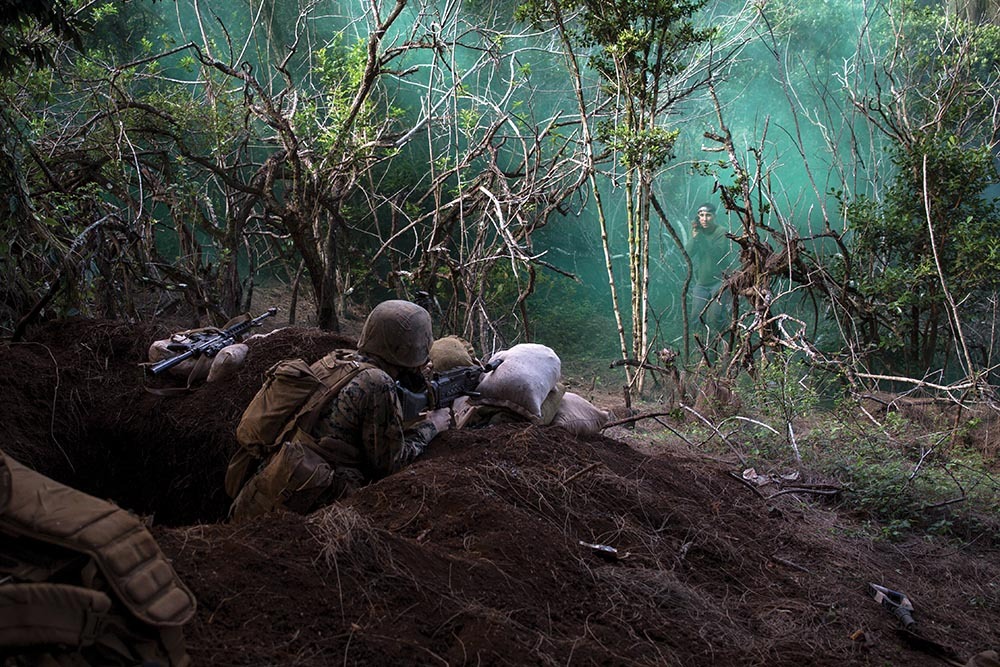
A Marine prepares to fire his M240 machine gun as part of the Advanced Infantry Course aboard the Kahuku Training Facility, Sept. 20, 2016.
‘If You Try, You Will Fail’LtCol Macander’s essay in War on the Rocks compared Scheller’s first video post with a 2007 essay written by then-Army LtCol Paul Yingling. Paul Yingling’s article “A Failure in Generalship,” published in the Armed Forces Journal, accused senior military leaders of failing to prepare U.S. armed forces for the Iraq war. The essay was not only critical of an institution—the general corps—but it also proposed solutions on how Congress could change the officer promotion system.
One line from Yingling’s article is still often cited in academic journals and by columnists today: “A private who loses a rifle suffers far greater consequences than a general who loses a war.”
In their essays on dissent, both Macander and Kerg point to Yingling as an example of someone who was critical of senior leadership but did not face any serious reprisals because of that criticism. Although he received much media attention because he was an active-duty officer who was critical of his senior leadership, Yingling eventually was promoted to colonel and was never charged with any crime under the UCMJ.
Macander puts Yingling’s essay in the category of acceptable dissent.
“The military establishment may not like hearing that it is not holding its general officer ranks accountable, but its treatment of Yingling shows that an assertion’s unpopularity alone does not make the dissent unacceptable,” Macander writes.
When Leatherneck contacted Yingling, who retired from the military in 2012 to pursue teaching, however, he stated in an email that some have recently used his experience to claim that an active-duty officer could “criticize the military without serious consequences.”
“Based on both my personal experience and the broader historical record, I can state with confidence that such a claim is false,” Yingling said. Yingling did not wish to state the specifics of those consequences other than the irony that by 2009, the Army was teaching his work at the Army War College, but he was not selected to attend the institution.
“I’ve never before discussed the personal consequences of my writing,” Yingling said. “I’m reluctant to do so now, as there are tens of thousands of Americans, and hundreds of thousands of Iraqis, who have suffered incalculably more from our misguided war efforts than I ever have or will from calling out those blunders.” While Yingling’s essay did not mark the end of his career—something he fully expected to happen—it didn’t achieve the outcome he intended.
“I’m not sure I’m the right person to ask for advice about expressing dissent, as I neither changed the system nor advanced within it,” Yingling said. “Nevertheless, it’s a fair question, and here’s my answer to aspiring dissenters: Don’t do it. You can’t change the system, and you shouldn’t try. If you try, you will fail, and you and your family will suffer, emotionally, socially, financially. … I failed, and you’ll fail too. You are not different. You are not special. You are not ‘the one.’ ”
Yingling warned that dissenting, or speaking truth to power, is not like “Mr. Smith Goes to Washington,” “where the plucky idealist speaks truth to power, gets the job, gets the girl, and lives happily ever after.”
“After hearing all that, most of you aspiring dissenters will decide to get along and go along within the system, as you should,” he said. “However, a couple of you will persist nevertheless, speaking truth to power without considering cost or consequence. Maybe you believe the issue is too important to remain silent. Maybe you just can’t live with yourself if you do something less than the full measure of your duty. Maybe you are the one.
“As Henry Ford said, ‘Whether you think you can or think you can’t—you’re right.’ ”
Author’s bio: 2ndLt Kyle Daly is a former journalist who enlisted in the Marine Corps in 2016. He was commissioned in 2021 and is currently stationed in San Antonio, Texas, undergoing training as a UAS officer.Before You Write, Know Your RightsServicemembers have a lot of leeway when it comes to the publishing world. However, if this is your first time driving through this territory, there are several rules of the road you should be aware of. The following is a summary of the various rules for active-duty members of the military and Department of Defense (DOD) employees when it comes to publishing in print or online. Leatherneck encourages servicemembers to seek their own resources and speak to their command before engaging in personal or professional publishing.
Disclaimer for Speeches and Writings Devoted to Agency Matters (DOD 5500.7-R: 2-207)A DOD employee who uses or permits the use of his military grade or who includes or permits the inclusion of his title or position as one of several biographical details given to identify himself in connection with teaching, speaking or writing … shall make a disclaimer if the subject of the teaching, speaking or writing deals in significant part with any ongoing or announced policy, program or operation of the DOD employee’s Agency … and the DOD employee has not been authorized by appropriate Agency authority to present that material as the Agency’s position.
The disclaimer shall be made as follows:
- The required disclaimer shall expressly state that the views presented are those of the speaker or author and do not necessarily represent the views of DOD or its components;
- Where a disclaimer is required for an article, book or other writing, the disclaimer shall be printed in a reasonably prominent position in the writing itself;
- Where a disclaimer is required for a speech or other oral presentation, the disclaimer may be given orally provided it is given at the beginning of the oral presentation.
Acceptable Political Activities by Members of the Armed Forces (DOD Directive 1344.10)A member of the Armed Forces on active duty may:
- Register, vote, and express a personal opinion on political candidates and issues, but not as a representative of the Armed Forces.
- Write a letter to the editor of a newspaper expressing the member’s personal views on public issues or political candidates, if such action is not part of an organized letterwriting campaign or a solicitation of votes for or against a political party or partisan political cause or candidate. If the letter identifies the member as on active duty (or if the member is otherwise reasonably identifiable as a member of the Armed Forces), the letter should clearly state that the views expressed are those of the individual only and not those of the Department of Defense (or Department of Homeland Security for members of the Coast Guard).
Social Media Guidelines(U.S. Marine Corps 2021 Social Media Handbook)
- Do not post classified or sensitive information
- Be the first to respond to your own mistakes
- Do not post defamatory, libelous, vulgar, obscene, profane, threatening, racially and ethnically divisive, or otherwise offensive or illegal information or material.
- Identify to readers or personal social media accounts that the views expressed are yours alone and that they do not necessarily reflect the views of the Marine Corps
- Discussing issues related to your personal experiences is acceptable, but do not discuss areas of expertise for which you have no background or knowledge
- Marines may generally express their personal views about public issues and political candidates on internet sites, including liking or following accounts of a political party or partisan candidate, campaign, group, or cause. If the site explicitly or indirectly identifies Marines as on active duty (e.g., a title on LinkedIn or a Facebook profile photo), then the content needs to clearly and prominently state that the views expressed are the Marine’s own and not those of the U.S. Marine Corps or Department of Defense.
Where Should I Submit my Work?Marines and other servicemembers have many options when it comes to getting their ideas and opinions published. Here’s a list of some online and print publications they can consider.
Marine Corps GazetteFounded in 1916, Gazette is known as the “Professional Journal of U.S. Marines” and its purpose, as stated in each issue, is to “provide a forum for the exchange of ideas that will advance knowledge, interest, and esprit de corps in the Marine Corps.” Have an opinion about Expeditionary Advanced Base Operations? How about Force Design 2030? These Marine Corps-specific topics probably fit best in a Marine Corps-specific journal. The Marine Corps Association publishes the monthly journal, which also includes a blog and social media presence. More information can be found at mca-marines.org.
Leatherneck While the Gazette is considered a professional journal, Leatherneck is the “Magazine of Marines.” Think of the Gazette as checking into a new unit in your uniform, and Leatherneck as checking out of the barracks in your civilian attire. Have a funny sea story to share? This is the place to do it. New to writing? The “Sound Off” section features short letters that provide the perfect opportunity to work on your craft. Leatherneck is also an outstanding forum for articles on all aspects of Marine Corps history from Marines in the Civil War to today’s veterans of Iraq and Afghanistan and welcomes submissions from Marines whether active, reserve, veteran or retired. And don’t forget about the annual Leatherneck writing contest, which provides Marines the opportunity to have a feature article published. More information can be found at mca-marines.org.
ProceedingsFounded in 1876, the United States Naval Institute publishes this magazine for readers interested in topics about the sea services, which includes the Navy, Marine Corps and Coast Guard. Writers include veterans, civilians and active-duty personnel. More information can be found at usni.org.War on the RocksArguably the national security website for the current generation, War on the Rocks began in 2013 as a podcast and is described as a “community focused on strategy, defense and foreign affairs.” Writers include civilians and active-duty servicemembers. Be prepared to break out some credentials though. They seek to publish the work from “the most authoritative, experienced, and authentic voices on defense, foreign policy and national security.”Armed Forces JournalDescribed as the “leading joint-service journal of commentary and ideas for U.S. military officers and leaders,” the aim for the publishers is to “provoke thoughtful debate,” according to its website. AFJ describes most of its readers as field-grade and flag officers. The journal is published by Sightline Media Group. Go to armedforcesjournal.com for more information.
Gen Berger was the guest of honor at the Marine Corps Association’s annual meeting, Sept. 15 in Arlington, Va.
The Commandant of the Marine Corps, Gen David H. Berger, and Sergeant Major of the Marine Corps, SgtMaj Troy Black, present Superior Achiever Awards to outstanding recruiters in San Antonio, Texas, Oct. 20, 2021.
Gen Berger was the guest speaker at the MCA’s West Coast Dinner in 2015 while he was serving as the Commanding General, I MEF.
The MCA’s annual meeting on Sept. 15 provided an opportunity for the Commandant to reunite with retired senior officials including SES Bryan Wood, LtGen Robert Ruark and LtGen David “Smoke” Beydler.
Marines from 3/8, commanded by Col David Berger, patrol the streets of Port-au-Prince, Haiti, during Operation Secure Tomorrow April 14, 2004.
MajGen Berger, left, the commanding general of Task Force Leatherneck, walks with LtCol David P. Bradney, commanding officer of 1/7, at FOB Shamsher, Helmand Province, Afghanistan, Aug. 9, 2012. (Photo by LCpl Jason Morrison, USMC)
CJCS Gen Joseph F. Dunford promoted the new CMC, Gen David H. Berger, at the Home of the Commandants, Washington D.C., July 11, 2019.
MajGen Berger, second from right, CG, TF Leatherneck, stands watch with Marines from “Fox” Co, 2/7 at FOB Now Zad, Helmand Province, Afghanistan, Nov. 22, 2012.
Gen Berger, far right, CMC, salutes as the American flag is folded during the West Virginia State Memorial Service for Medal of Honor recipient CWO-4 Hershel “Woody” Williams in Charleston, W.Va., July 3.


